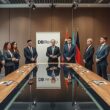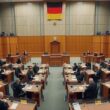The automotive supplier ZF is facing a significant overhaul as Mathias Miedreich prepares to assume the role of CEO in October, signaling a harsh restructuring and further cuts within the company’s struggling powertrain division. Addressing the “Frankfurter Allgemeine Zeitung” Miedreich emphasized the immediate necessity of halting losses, stating that collaboration with external partners is predicated on ZF demonstrating its operational viability.
The restructuring is being driven primarily by two factors: a critical re-evaluation of “make-or-buy” decisions and a confronting assessment of production volumes. Miedreich highlighted the contraction of the automotive market compared to the pandemic era and acknowledged that ZF’s capacity, particularly in electric mobility, currently exceeds demand. “We need to reduce the excess capacity to ensure a future for our employees within the powertrain division” he explained.
Previously, decisions regarding the future of the powertrain division were postponed until the end of September, providing Miedreich time to negotiate a solution with the company’s general works council. Core to these discussions is a candid assessment of ZF’s strengths and weaknesses, prompting the company to definitively determine which components to continue producing internally and which to procure externally. The goal is to enhance the competitiveness of ZF’s systems, particularly in areas like transmissions, electric axles and range extenders.
Miedreich indicated that a complete spin-off of the powertrain division, potentially through a joint venture with a partner, is among the possible solutions being explored. He added that smaller partnerships are possible if ZF has confidence in its ability to secure competitiveness. Conversely, if that objective proves unattainable, exploring spin-offs and joint venture models will be essential.
In response to the ongoing debate regarding future regulations for the automotive industry, Miedreich advocates for a more flexible approach. He refuted the notion that electric mobility represents the sole viable solution, emphasizing the vital role of hybrid systems. “Hybrid development is now the primary axis” he stated, suggesting that the question of the optimal powertrain remains unresolved.
The Supervisory Board recently voted to remove Holger Klein as CEO and appoint Miedreich as his successor, a move justified by the board’s recognition of Miedreich’s decisiveness and communication abilities. He is set to officially take leadership at the Friedrichshafen-based company in early October. Describing his management style prior to his appointment, Miedreich stressed the importance of transparency and open communication, asserting that addressing uncomfortable truths directly is crucial for maintaining trust and collaboration.





